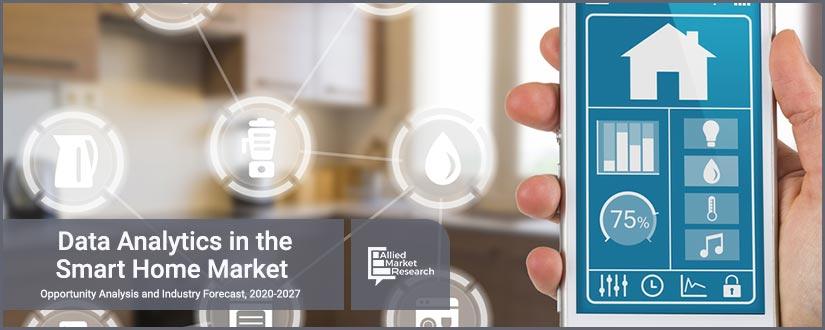Data Analytics in the Smart Home Market Statistics: 2027
Data analytics in smart home technology enables controlling all smart devices remotely with an internet of things (IoT) activated system. These connected smart devices in smart homes are able to interpret user behavior and analyze user data, owing to data analytics solutions in smart homes. With this data, security companies can increase security measures and data concerns over time. In addition, this data collection also helps to improve comfort and safety of consumers. Data analytics in smart home offers remarkable benefits to end users such as it is highly cost-effective, improves security, integration of IoT devices, reduces energy consumption, and helps in easy handling of regular household tasks. Data analytics is also increasingly being used in smart homes to offer services to consumers. British Gas, for instance, offer a new service in partnership with Worcester Bosh called Boiler IQ, which detects a boiler’s performance and notifies customers when it is malfunctioning.
COVID-19 Scenario Analysis:
- COVID-19 has lead to decrease in interest in consumer IoT devices as consumers are spending considerable time at home, as they do not go out and buy personal IoT devices at a large scale.
- Korea, used its “Smart City Data Hub” to allow epidemiological investigators request, obtain, and confirm data about coronavirus cases and people they had come into contact with making smart city platforms a key application in containing COVID-19 spread.
- Nest, is offering Learning Thermostat an app that reveals user energy consumption and recommendations on how to reduce usage.
Top impacting factors: Market Scenario Analysis, Trends, Drivers, and Impact Analysis
The major factors that contribute toward rise in demand for data analytics in the smart home market includes growth in adoption of smart devices among the end-users and the rising demand for real time home security solutions and consumer electronics across the globe. With expansion in internet user base, consumers have significantly shifted toward adoption of smart home monitoring systems, which can be automatically controlled using smartphones or smart gadgets and predict result according to user behavior, and, in turn, boost the demand for data analytics in the smart home market. Smart homes help in decreasing energy consumption while delivering an unforgettable experience to end-users encouraging demand for data analytics in smart home. However, huge cost involved in the installation of smart home appliances and data privacy concerns hamper growth of the data analytics in the smart homes market. Contrarily, rise in implementation of smart speakers, home appliances, and light control systems among target customers would accelerate growth in demand for data analytics in the smart home market. In addition, various government initiatives are focused on spreading environmental awareness by use of energy-saving and low carbon emission solutions, thereby encouraging customers to opt for the smart home system market during the forecast period.
Adoption of big data analytics in smart home technology
Increase in use of big data analytics in smart home would offer various advantages such as uses of algorithms to locate models, which provides usable insights, reduction in energy consumption in homes, advanced operations such as adding option of solar panel and integration of artificial intelligence to create more intuitive systems. These factors have turned home into a more practical digital center, which propels demand for data analytics in the smart home market.
Emerging trend of smart devices in entertainment industry
A multi-room entertainment control system allows users to centralize all connected devices and then listen to, watch, and control that equipment from house simultaneously. Major control systems used in the smart homes market system are audio, volume, and multimedia room controls. Growth of the market for audio, volume, and multimedia room controls is driven by convenience offered by these controls for managing as well as controlling entertainment systems within a house. Cost reduction over electricity consumption is also encouraging the smart home market.
Key benefits of the report:
- This study presents analytical depiction of the global data analytics in smart home industry along with the current trends and future estimations to determine the imminent investment pockets.
- The report presents information related to key drivers, restraints, and opportunities along with detailed analysis of the global data analytics in the smart home market share.
- The current data analytics in the smart home market is quantitatively analyzed to highlight the market growth scenario.
- Porter’s five forces analysis illustrates the potency of buyers & suppliers in the market.
- The report provides detailed global data analytics in the smart home market analysis based on competitive intensity and how the competition will take shape in coming years.
Data Analytics in the Smart Home Market Report Highlights
| Aspects | Details |
| By Component |
|
| By Product |
|
| By Region |
|
| Key Market Players | Google LLC, Whisker Labs, Inc., Siemens AG, Apogee Interactive Inc., Apple Inc., Oracle Corporation, Amazon.com, Inc., Bidgely Inc., ADT Inc. |
Loading Table Of Content...




